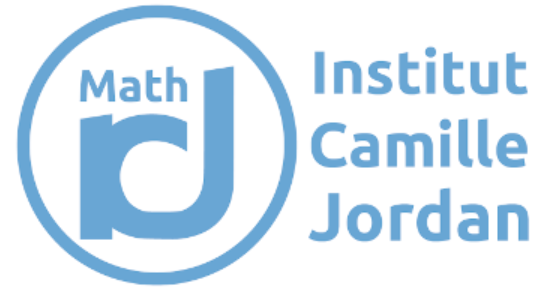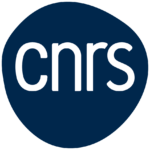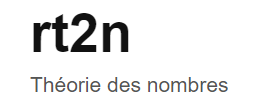Organizing Committee
Comité d’organisation
Boris Adamczewski (CNRS, Université Claude Bernard Lyon 1)
Giuseppe Ancona (IRMA Strasbourg)
Sara Checcoli (Université Grenoble Alpes)
RT2N is a new French network in number theory created by the CNRS in January 2024. This network brings together more than four hundred number theorists working in CNRS laboratories in France and abroad. The scientific field covered by the network is number theory in the broadest sense, and its interactions with other areas of mathematics and computer science. One of rt2n’s main objectives is to contribute to the training, integration and scientific success of young researchers in number theory (PhD students, post-doctoral students, assistant professors and junior CNRS researchers).
The school EThéN inaugurates a new cycle of regular meetings of the rt2n, aiming to bring together its members, especially the younger ones. Short courses given by established mathematicians are complemented by talks and poster presentations by PhD students and early-career colleagues. The courses, designed to be pedagogical and accessible to a wide audience, aim to provide participants with an introduction to certain classical problems as well as an overview of recent advances in various areas of number theory.
For this first edition, the themes chosen for the five short courses include arithmetic and Diophantine geometry (particularly results on the study of rational points on curves of high genus by Lawrence-Venkatesh and Gao-Habegger-Dimitrov), analytic number theory (especially recent results by Maynard and equidistribution theorems by Deligne and Katz), as well as Hilbert’s tenth problem and model theory. The courses will be structured so that the audience can see a variety of techniques and methods (algebraic, analytic, and geometric), as well as points of contact between different themes. The meeting will be enriched by a presentation of the proof assistant software LEAN.
Le rt2n est l’un des nouveaux réseaux thématiques créé par CNRS Mathématiques en janvier 2024. Le champ scientifique couvert par ce réseau est la théorie des nombres dans son acception la plus large, ainsi que ses interactions avec les autres domaines mathématiques et l’informatique. Il regroupe plus de quatre cents théoricien·ne·s des nombres réparti·e·s sur tout le territoire français, y compris la Polynésie française, ainsi qu’au Canada via l’IRL CRM-CNRS. L’un des objectifs principaux du rt2n est de contribuer à la formation, l’insertion et la réussite scientifique des jeunes chercheuses et des jeunes chercheurs en théorie des nombres (doctorant·e·s, postdoctorant·e·s, MCF et CR).
L’école EThéN inaugure un nouveau cycle de rencontres régulières du rt2n, visant à fédérer ses membres, notamment les plus jeunes. Des cours dispensés par des mathématicien·ne·s confirmé·e·s sont complétés par des exposés courts et la présentation de posters par des doctorant·e·s et des collègues en début de carrière. Les cours proposés, conçus pour être pédagogiques et accessibles à un large public, ont pour objectif d’offrir aux participant·e·s une introduction à certains problèmes classiques ainsi qu’un aperçu d’avancées récentes dans des thématiques variées relevant de la théorie des nombres.
Pour cette première édition, les thèmes choisis pour les cinq cours incluent la géométrie arithmétique et diophantienne (et notamment les résultats sur l’étude des points rationnels des courbes de grand genre par Lawrence-Venkatesh et Gao-Habegger-Dimitrov), la théorie analytique des nombres (notamment les résultats récents de Maynard et les théorèmes d’équidistribution de Deligne et Katz), ainsi que le dixième problème de Hilbert et la théorie des modèles. La rencontre sera enrichie par une présentation de l’assistant de preuve LEAN et du rôle qu’il peut
être amené à jouer pour les mathématiques et plus particulièrement la théorie des nombres. Les cours seront structurés pour que le public puisse à la fois apprécier une large palette de techniques et méthodes (algébriques, analytiques et géométriques), mais aussi des points de contact entre différentes thématiques.
LECTURES
Laura Capuano (University of Roma Tre) Uniformity results in Diophantine Geometry
Emmanuel Kowalski (ETH, Zürich) Equidistribution of Frobenius classes, from Kronecker to Katz
Marco Maculan (IMJ-PRG, Paris) Diophantine finiteness, from the unit equation to Shafarevich conjecture
Vlerë Mehmeti (IMJ-PRG, Paris) Hilbert’s tenth problem and local-global principles
Sophie Morel (CNRS, UMPA, Lyon) Number theory in the proof assistant software LEAN
Joël Rivat (Aix-Marseille Université) Prime numbers





